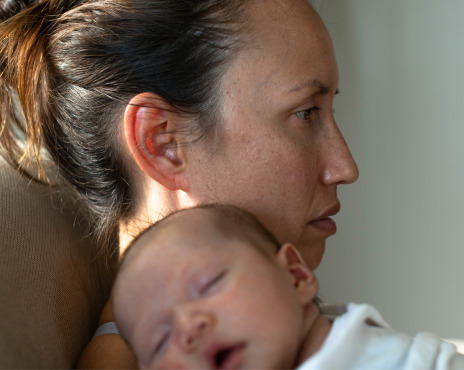If You Are Contemplating Self Harm, Please Seek Help.
Postpartum rage is a common, yet often unspoken, experience. If you’re struggling with thoughts of harming yourself or your baby, please reach out for help. Call the Suicide & Crisis Lifeline at 988. Also consider contacting Postpartum Support International at 1-800-944-4466.
Are You Experiencing Postpartum Rage?
Postpartum rage is a real but often overlooked experience that some new mothers face after childbirth. It involves sudden, intense feelings of anger or frustration that can feel overwhelming and out of control. While many women experience mood swings after having a baby, postpartum rage goes beyond typical emotions, often triggered by hormonal changes, sleep deprivation, and the stress of adjusting to motherhood.
What Is Postpartum Rage?
Postpartum rage is an intense, sudden feeling of anger or frustration that many new mothers experience after childbirth. It can strike unexpectedly, making you feel completely overwhelmed or even out of control. This isn’t just typical “baby blues” or mild irritability—it’s a deeper, stronger emotion that can leave you questioning why you’re so angry, even when things seem to be going okay. Women who experience Postpartum rage are in good company, and according to a study, about 35% of women experience feelings of anger about 6 weeks postpartum.
Postpartum Rage is Not Common Mood Swings
While mood swings are common after having a baby—thanks to the mix of emotions that come with new motherhood. Postpartum rage is more extreme. It’s not just about feeling irritated or upset for a few minutes. It’s an intense outburst of anger or frustration that feels disproportionate to the situation. For example, you might find yourself furious over something small, like a messy room, and struggle to calm down, even if you know the anger isn’t logical. According to the Cleveland Clinic, Unlike Postpartum Depression, Postpartum rage is not considered a mood disorder and is very under researched.
What Causes Postpartum Rage?
Postpartum rage is often linked to the big changes your body goes through after giving birth. Hormonal shifts—particularly drops in estrogen and progesterone—can have a powerful impact on your mood and emotions. On top of that, sleep deprivation and the overwhelming demands of caring for a newborn can leave you feeling exhausted and stretched thin. When your body and mind are both running on empty, it’s no surprise that emotions can explode, even if you don’t fully understand why.
Postpartum Rage Symptoms
Postpartum rage can be overwhelming, and its symptoms may feel hard to control. Here are some of the most common signs:
- Intense irritability, frustration, or anger: This can feel like a constant undercurrent of irritation, often triggered by small things that wouldn’t usually bother you. You might find yourself snapping over minor inconveniences or feeling more easily frustrated than normal.
- Sudden outbursts or loss of control: Postpartum rage can cause sudden, intense bursts of anger that might catch you off guard. In these moments, you may feel completely overwhelmed, like you can’t stop yourself from reacting, even if you know your anger isn’t in proportion to the situation.
- Emotional numbness or detachment: Some women experience a sense of emotional disconnection from themselves or others. You might feel emotionally distant from your baby or your partner, or even numb to things that normally bring you joy.
- Physical symptoms: The emotional intensity of postpartum rage often comes with physical manifestations like muscle tension, shaking, or a rapid heartbeat. These signs can be your body’s response to heightened stress or anger, adding another layer of difficulty to the experience.
How Long Can Postpartum Rage Last?
While postpartum rage is most likely to occur 6 weeks to a year after giving birth, there is no specific timeline for postpartum rage to resolve itself. Jill Zechowy, MD, MS, a perinatal mental health physician specializing in postpartum mood and anxiety disorders, shared with The Bump that “Postpartum rage can persist as long as a mother continues to feel overwhelmed and exhausted.
How Postpartum Rage Differs from the "Baby Blues" or Postpartum Depression
While many new mothers experience mood swings, sadness, or irritability in the first few weeks after childbirth postpartum rage is different in both intensity and nature. The baby blues are usually temporary and tied to the emotional adjustments of new motherhood. Postpartum depression, on the other hand, often involves feelings of deep sadness, hopelessness, and a lack of energy or motivation, which are distinct from the explosive anger that characterizes postpartum rage.
What sets postpartum rage apart is the sudden, uncontrollable anger that can feel almost like an external force taking over. It’s less about sadness or overwhelm, and more about a visceral, emotional reaction that can be frightening for both the mother and those around her. Understanding these symptoms can help mothers recognize when their emotions are beyond typical adjustments and may require support or treatment.

Are You Struggling Postpartum?
Obria Medical Clinics is here to offer the support you need. You are not alone—reach out today for compassionate care and guidance. Book with us today to get the support you need.
Practical & Holistic Strategies for Coping With Postpartum Rage
Take Postpartum Supplements
During pregnancy, a woman’s body goes through significant physical and hormonal changes, often leading to depletion of essential nutrients and energy reserves. This depletion can contribute to feelings of fatigue, emotional instability, and even conditions like postpartum rage. To help replenish the body and support recovery after childbirth, many women turn to postpartum supplement formulas. Supplements like New Chapter’s Perfect Postnatal Multivitamin or Pink Stork’s Postnatal Moode Support are specifically designed to restore nutrients lost during pregnancy and labor, such as iron, calcium, magnesium, and omega-3 fatty acids. By replenishing these vital nutrients, supplements can help balance mood, support overall physical health, and reduce the intensity of emotional shifts that can accompany the postpartum period.
Other Practical Coping Strategies
In search of ways to deal with postpartum rage? Be sure to make time for yourself to do the following during an overwhelming period:
- Rest and Sleep: Take naps and ask for help to ensure adequate rest.
- Deep Breathing: Use deep breathing or meditation to calm yourself in stressful moments.
- Exercise: Incorporate daily movement, like walks, to release tension and boost mood.
- Set Realistic Expectations: Don’t aim for perfection—ask for help when needed.
- Establish a Support System: Lean on friends or family for emotional support and connection.
- Self-Care: Carve out small moments for yourself to recharge.
- Communicate Your Needs: Be clear with your partner about how they can help.C
- Calm Environment: Create a peaceful space at home to reduce stress.
- Focus on Positives: Shift your attention to small wins or things you’re grateful for.
Partners and family can significantly help mothers experiencing postpartum rage by offering understanding, empathy, and practical support. Don’t hesitate to ask for help. llenging time and help her make time for herself. Don’t be afraid to ask for support.
Treatment for Postpartum Rage
Seek Therapy or Professional Support
herapy provides a safe and structured space to explore the emotional and psychological roots of postpartum rage. Cognitive Behavioral Therapy (CBT) is one of the most commonly used therapeutic approaches for addressing postpartum mood disturbances. It helps women recognize and change negative thought patterns and behaviors that contribute to feelings of anger, frustration, or helplessness, and work through any instances of trauma.
Consider Medication
In some cases, when the intensity of postpartum rage or other mood symptoms is severe or unmanageable, medication may be necessary. Antidepressants, particularly selective serotonin reuptake inhibitors (SSRIs), are commonly prescribed for postpartum depression and anxiety, which often co-occur with rage. These medications help balance brain chemistry and improve mood, making it easier for mothers to manage their emotions
Resources for Postpartum Rage
- Obria Medical Clinics: We offer postnatal support and extensive resources.
- 988 Suicide & Crisis Lifeline: Call or text 988 to connect with a crisis counselor.
- Postpartum Support International: 1-800-944-4466
- Mental health professionals: Therapists specializing in perinatal mental health can provide therapy and medication management.
- Support groups: Connecting with other mothers who understand can be helpful. Look for local or online support groups.
- Hotlines and helplines: Many countries have specific helplines for maternal mental health. Check with your local healthcare provider or search online.
Remember, it’s important to seek help. Postpartum rage is a treatable condition, and you don’t have to go through it alone.
When to Seek Professional Help
If your anger is paired with sadness, anxiety, or intrusive thoughts, it may signal a more serious condition like postpartum depression or PTSD. If you have thoughts of harming yourself or your baby, seek immediate help by calling 911 or going to the nearest emergency room. You don’t have to face this alone—support is available. Our caring team at Obria is here to walk alongside you through your postpartum journey with compassion and care.
Summary:
We explored the menstrual cycle by breaking it down into its distinct phases: the menstrual phase, follicular phase, ovulatory phase, and luteal phase. Each phase comes with its own set of symptoms and hormonal changes that can affect your mood, energy levels, and overall health. We also discussed the importance of tracking your cycle to gain valuable insights into your body, whether you’re trying to conceive or manage PMS. By understanding these phases and the changes your body undergoes, you can better navigate your health and wellness.
Your Reproductive Health, Our Priority
Book low cost reproductive health services today at an Obria Medical Clinic near you!

